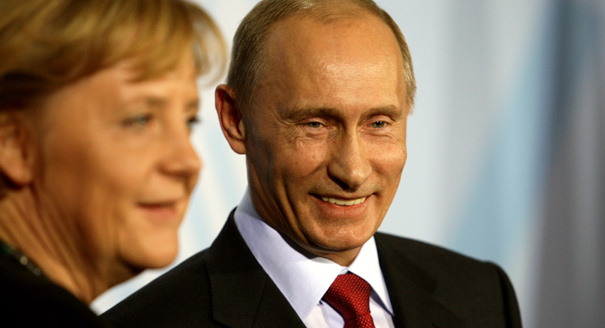The EU’s sanctions on Russia come up for renewal in the coming weeks and months. Until now, it was assumed the measures would be rolled over. The so-called Minsk II accord, which was negotiated in February by German Chancellor Angela Merkel, Russian President Vladimir Putin, and his French and Ukrainian counterparts to end the fighting in eastern Ukraine, has not been fulfilled. Merkel has always insisted that the terms of the accord be implemented fully before the EU considers lifting the sanctions.
But two issues—the terrorist attacks in Paris on November 13 and the unremitting flow of refugees to Europe—are already changing Merkel’s role in Europe. These emergencies are also putting Ukraine on the back burner.
In short, EU leaders have to decide if they are going to trade off the future of Ukraine for cooperation with Russia. Such a move would undo everything the EU has tried to achieve since the beginning of the Ukraine crisis in November 2013.
Since then, the EU has started to look at Ukraine no longer through the prism of Russia but as a country intent on defining its own sovereignty, independence, and identity. To return to the status quo ante would amount to Ukraine once again being used as a pawn in Europe’s relations with Russia. Is this what the EU really wants?
Merkel’s role is crucial. It was she who pushed all the other 27 EU member states to impose sanctions on Russia in the wake of its March 2014 annexation of Crimea and its meddling in eastern Ukraine. And it is she who is holding firm on the implementation of the Minsk II accord.
In addition to putting in place a ceasefire, the accord stipulates the withdrawal of all heavy weapons from the frontline and full access for the Organization for Security and Cooperation in Europe (OSCE), which is monitoring the ceasefire, to the border between Russia and Ukraine. Progress has been made on the first task but not the second. And the ceasefire, which held during October 2015, is far from stable, as recent violations reported by the OSCE confirm.
Merkel managed to keep all EU leaders on board regarding the sanctions, despite strong opposition from Hungary, Slovakia, the Czech Republic, and Greece. But her standing among the Central European countries has taken a battering because of her open-door policy toward the refugees.
The #Parisattacks and the #refugeecrisis put #Ukraine on the back burner.Tweet This
Viktor Orbán, the conservative prime minister of Hungary, has blamed Merkel for the uncontrolled influx of refugees to Europe. He responded by building a razor-wire fence between Hungary and Serbia, in addition to refusing to accept any refugees. On November 16, the Hungarian parliament passed a law challenging the EU’s decision in September to impose a mandatory system of refugee relocation among EU countries.
More worryingly, and cynically, Orbán and other EU leaders including the new Polish Prime Minister Beata Szydło are now linking the terrorist attacks in Paris to the refugees reaching Europe, even though it has been shown that the main perpetrators of the attacks were either French or Belgian citizens.
That seems an irrelevant detail. Most Central European countries will be even more determined not to accept refugees as anti-Muslim sentiments and fears of terrorist attacks increase across the region.
Moreover, since Putin has eagerly joined the military coalition against the Islamic State—a move that will benefit Syria’s President Bashar al-Assad, who has inflicted appalling suffering on his people—such cooperation could change the EU’s attitude toward Russia.
As a reward for Moscow’s cooperation, several EU leaders may well conclude it is time to welcome Russia back into the fold. One way to do this would be to draw a line under Ukraine. That would mean lifting the sanctions. Given Merkel’s unpopularity in Central Europe as well as among some Western European countries, she could be hard-pressed to retain EU unity over maintaining the sanctions.
The EU has no alternative but to keep its sanctions imposed on #Russia.Tweet This
However, the EU has no alternative but to keep the sanctions imposed on Russia. To make them (and Ukraine) a pawn in securing cooperation from Russia in confronting the Islamic State would be tantamount to disowning all efforts to make this kind of soft power work.
In addition, it would give a green light for Russia to continue meddling in Ukraine because the EU would lose what leverage it had at its disposal. It would also completely undermine the Minsk II accord. Whatever the merits and impact of the sanctions, they have been the EU’s only real pressure point on Russia. Their introduction was also one of the rare occasions on which the EU held together.
Realpolitik could undermine the EU’s policy toward Ukraine while rewarding Russia. But it’s a realpolitik not guaranteed to succeed. And it’s a realpolitik devoid yet again of any EU strategy toward Russia, toward the deep crisis in Middle East, and even toward the EU’s own security.








